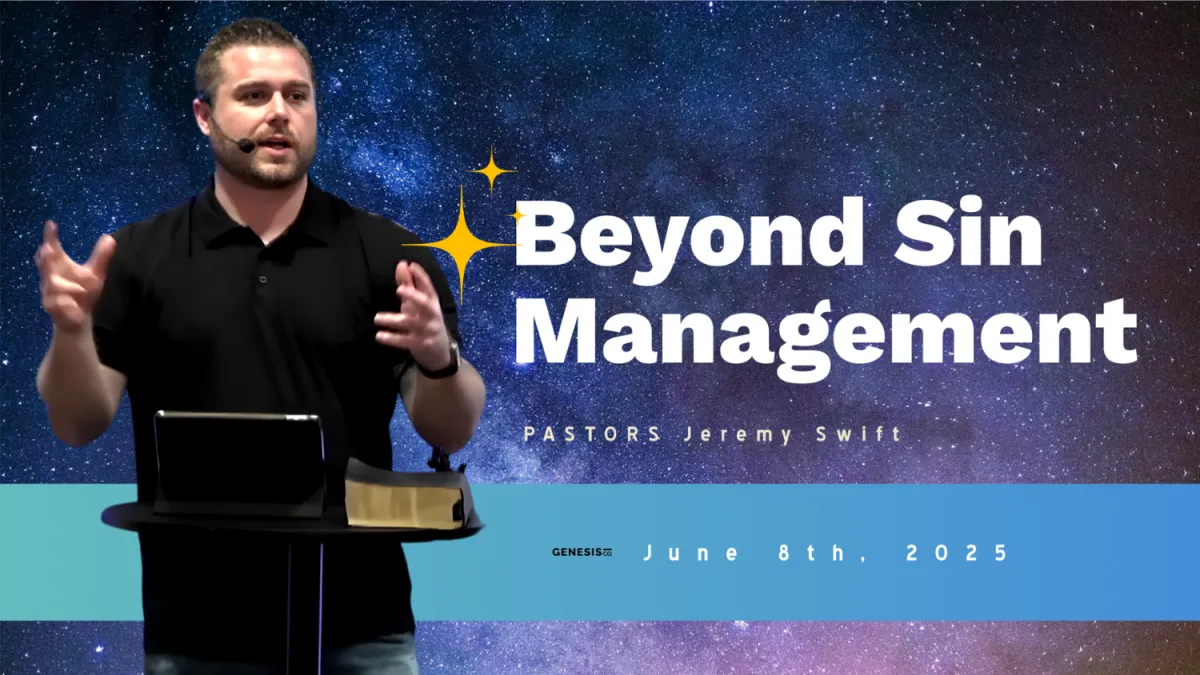
A Journey Through 1 John: Beyond Sin Management
Beyond Sin Management: Understanding God's Truth and Our Response
In a world filled with darkness, God calls us to walk in His light. But what does this really mean for our daily lives? How do we balance our relationship with Jesus while addressing sin in our lives?
What Does It Mean That God Is Light?
First John 1:5 tells us, "God is light, and in him is no darkness at all." This powerful statement sets the foundation for understanding our relationship with God.
When we think about light, it:
Exposes reality and shows us how things should be
Represents purity and goodness
Brings clarity and rightful view
Is energy that brings life
God being light means He is the epitome of purity and goodness. There is absolutely no darkness in Him - no sin, no evil, no wickedness. This is a concept so perfect that it's difficult for us to fully comprehend.
What Happens When We Walk in Darkness?
The passage continues in verses 6-7: "If we say we have fellowship with him while we walk in darkness, we lie and do not practice the truth. But if we walk in the light, as he is in the light, we have fellowship with one another, and the blood of Jesus his Son cleanses us from all sin."
Walking in darkness refers to living in sin - missing God's mark and getting things out of order from how He intended them to be. The early church faced false teachings (Gnosticism) that suggested what we do with our physical bodies doesn't matter spiritually. This dangerous idea implied people could follow Christ while continuing to live however they wanted.
John firmly rejects this notion. When we claim to follow Jesus but continue living in darkness without remorse or desire to change, we're not being truthful about our relationship with God.
How Should We View Sin in Our Lives?
Scripture gives us a balanced perspective on sin:
We must acknowledge sin exists: "If we say we have no sin, we deceive ourselves, and the truth is not in us" (v.8)
Confession brings forgiveness: "If we confess our sins, he is faithful and just to forgive us our sins and to cleanse us from all unrighteousness" (v.9)
Denying sin makes God a liar: "If we say we have not sinned, we make him a liar, and his word is not in us" (v.10)
Being God's people doesn't mean denying sin exists - it means confessing it when it happens. This creates a healthy tension in our spiritual lives.
What's the Right Balance Between Grace and Holiness?
Here's an important truth: A healthy, love-based pursuit of holiness is the byproduct of a real, vibrant relationship with Jesus.
Many of us have experienced two unhealthy extremes:
Some traditions teach we must "do things" to earn God's favor
Others suggest that since God loves us, it doesn't matter how we live
Both miss the mark. The truth is:
Sin doesn't sever our relationship with God (If we have accepted Jesus as Savior we don't lose salvation when we sin)
But sin can damage our fellowship with God (like Adam and Eve in the garden)
The key is understanding that walking in truth, walking in light, and maintaining fellowship with other believers naturally flows from a genuine relationship with God.
How Do We Focus on Jesus Instead of Sin?
The solution isn't to obsess over not sinning - it's to focus on Jesus. When we fix our eyes on Him and His beauty captivates us, sin becomes less appealing.
In Revelation, Jesus addresses the church at Ephesus, commending their good works but warning them they had left their first love. The solution? "Remember therefore from where you have fallen; repent, and do the works you did at first."
When we return to our first love - Jesus himself - everything else falls into its proper place. Our desire to walk in light and avoid darkness flows naturally from our love for Him.
Life Application
This week, I challenge you to shift your focus from "trying not to sin" to actively pursuing Jesus. Instead of being motivated by fear of doing wrong, let your actions be motivated by love for Christ.
Ask yourself these questions:
Am I more focused on avoiding sin or on loving Jesus?
When I fail, do I allow shame to keep me from God, or do I quickly confess and return to fellowship?
How can I practically "return to my first love" this week through prayer, worship, and time in God's Word?
In what areas of my life might I be justifying darkness while claiming to walk in light?
Remember, we don't focus on not sinning - we focus on Jesus. When we have a rightful view of Him and walk in His light, we'll naturally have a proper view of ourselves and place sin in its rightful context.